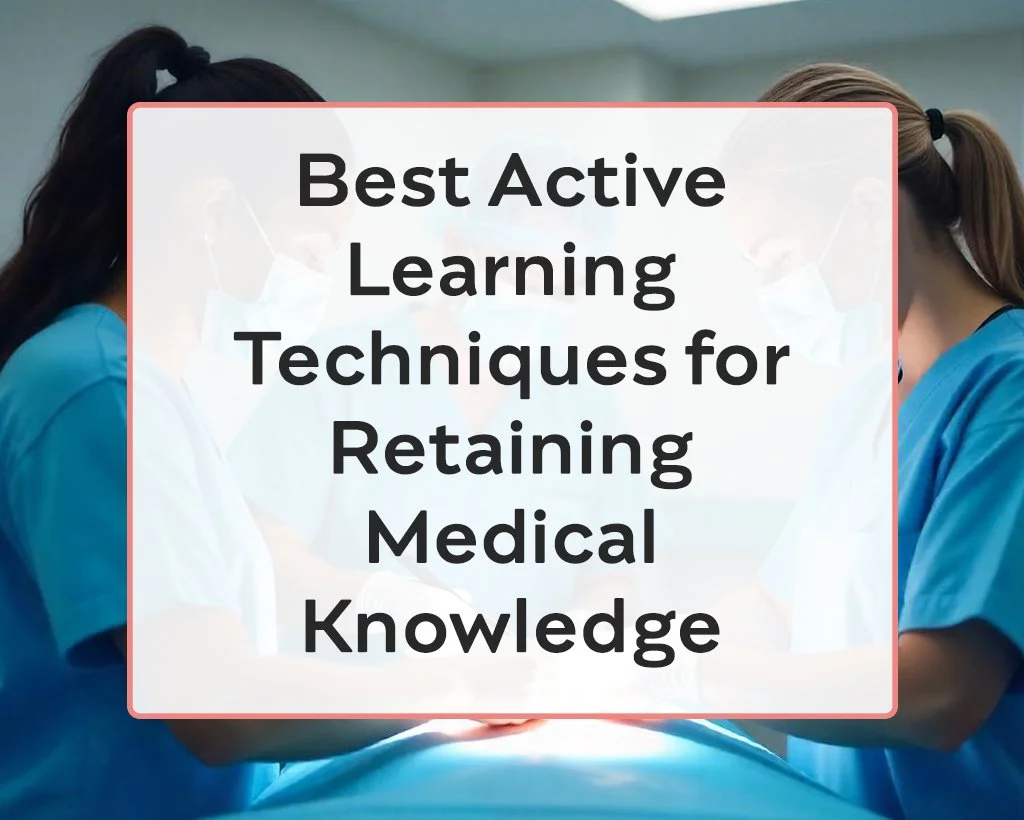Best Active Learning Techniques for Retaining Medical Knowledge
Medical school demands extensive memorization and deep understanding of complex concepts. Passive studying, such as reading textbooks or highlighting notes, is not enough to ensure long-term retention. Active learning techniques engage students more effectively and enhance retention. In this blog, we’ll explore the best active learning strategies for medical students and how they can be applied for maximum impact.
1. Spaced Repetition for Long-Term Retention
Spaced repetition is a scientifically proven technique that enhances memory by reviewing information at increasing intervals over time. Medical students can use this technique through apps like:
Anki – Uses flashcards with an algorithm that schedules reviews based on performance.
Quizlet – Allows for spaced repetition through custom flashcards.
King of the Curve App – Offers interactive quizzes to reinforce learning efficiently.
2. Active Recall: Testing Yourself to Strengthen Memory
Active recall involves retrieving information from memory rather than passively reviewing it. This can be done by:
Closing a book and summarizing key points from memory.
Using flashcards to quiz yourself.
Answering past USMLE or NBME questions without looking at the answers first.
3. The Feynman Technique: Simplify Complex Concepts
The Feynman Technique involves explaining a topic in simple terms as if teaching a child. This helps to:
Identify gaps in knowledge.
Improve understanding and retention.
Reinforce learning through teaching.
4. Interleaving: Mix Up Your Study Subjects
Instead of studying one subject in isolation for long periods, interleaving involves mixing different topics within a single study session. For example:
Studying microbiology for 30 minutes, then switching to pathology.
Practicing different types of USMLE question formats in one session.
Applying clinical cases that involve multiple disciplines.
5. Teaching Others: Reinforce Learning Through Explanation
One of the best ways to solidify medical knowledge is to teach it to someone else. This can be done by:
Joining a study group and explaining concepts.
Creating short tutorial videos or presentations.
Mentoring junior medical students.
6. Problem-Based Learning (PBL) and Case Studies
Applying knowledge to real-world scenarios enhances critical thinking. Medical students can:
Use clinical cases to diagnose and manage conditions.
Participate in case-based discussions.
Join PBL sessions to work through patient scenarios collaboratively.
7. Gamification and Interactive Learning
Turning learning into a game can make studying fun and effective. Try:
King of the Curve App – Offers gamified quizzes for USMLE and medical subjects.
Medical Trivia and Quizzes – Engaging, competitive learning experiences.
Board Game-Style Learning – Using educational games to reinforce concepts.
8. Mind Mapping for Visual Learning
Mind maps help organize information visually, making it easier to recall. This technique is useful for:
Connecting related topics (e.g., linking disease pathophysiology, symptoms, and treatment).
Summarizing large amounts of information on one page.
Improving recall by associating images with concepts.
9. Using Mnemonics and Memory Aids
Mnemonics are helpful shortcuts for remembering complex information. Examples include:
"SOAP ME" for emergency drugs: Suction, Oxygen, Airway, Pharmacology, Monitoring, Equipment.
"DR C. HEALS" for cranial nerves: Damage, Reflex, Contraction, etc.
Visual mnemonics, such as Sketchy Medical or Picmonic.
10. Practical Application and Hands-On Learning
Applying knowledge in clinical settings reinforces what has been studied. Ways to do this include:
Observing and assisting in patient care.
Performing procedures under supervision.
Engaging in simulations and virtual clinical scenarios.
How 'King of the Curve' Can Help You Master Medical Knowledge
The King of the Curve app is designed to enhance active learning through:
Interactive quizzes tailored to USMLE topics.
Customizable study plans based on performance.
Gamification strategies to keep learning engaging and effective.
Real-time performance tracking to identify weak areas.
Final Thoughts
Active learning is the key to mastering and retaining medical knowledge efficiently. By incorporating techniques like spaced repetition, active recall, teaching, and gamification, medical students can improve their understanding and performance. Start implementing these strategies today and take your medical studies to the next level!
Frequently Asked Questions (FAQs)
-
Aim for 4-6 focused hours, ensuring you incorporate breaks to avoid burnout.
-
Practice mindfulness techniques, take practice exams under realistic conditions, and maintain a balanced lifestyle.
-
Set short-term goals, seek support from mentors, and reward yourself for small achievements.
-
Regular exercise improves focus, reduces stress, and enhances overall mental clarity.
-
KOTC offers personalized learning tools, gamification features, and adaptive question banks to help students stay on track without burnout.


